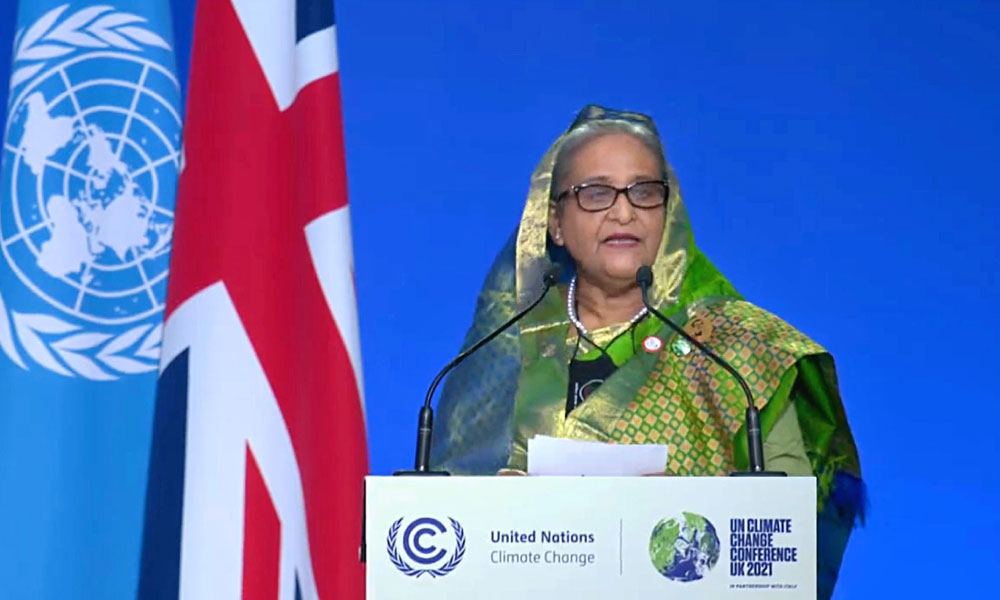Bismillahir Rahmanir Rahim
President of the COP26
Hon’ble Heads of State and Government,
Mr. Secretary General of the United Nations,
Excellencies, Ladies and Gentlemen
Assalamu Alaikum, and a very good afternoon to you all.
I express my sincere thanks to the Government of the United Kingdom for hosting the COP26.
Excellencies,
- While contributing less than 0.47% of global emissions, Bangladesh is one of the most climate-vulnerable countries. To address this challenge, we established the “Bangladesh Climate Change Trust Fund” in 2009 for climate adaptation and so far have allocated 480 million dollars to this fund from our own resources. We have doubled climate-related expenses in the last seven years. Currently, we are preparing the National Adaptation Plan.
Distinguished Participants,
- In our Annual Development Plan, the climate-relevant allocation has doubled, increased from about US$ 1.44 billion in Financial Year 2015-16 to about US$ 2.96 billion in Financial Year 2021-22 for climate adaptation and resilience-building through steps such as construction of sea dykes, cyclone shelters and coastal plantation.
- We are implementing the world’s biggest housing project for people displaced by impacts of climate change in Cox’s Bazar to construct 139 multi-storied buildings with all amenities to shelter 4,409 climate change affected families. Under the “Ashrayan” project, a landmark initiative of my government for the landless and homeless people, a total of 442,608 families have been given houses.
- The government has adopted the “Bangladesh Delta Plan 2100”, a comprehensive 100-year strategic plan aimed at gradual sustainable development through adaptive delta management process targets to achieve a safe, climate-resilient and prosperous delta. Our new National Adaptation Plan will be the main vehicle to address adaptation at the national level.
Excellencies,
- Bangladesh has one of the world’s most extensive domestic solar energy programmes. We have installed more than six million solar home systems in off grid areas of the country ensuring supply of solar electricity to 18 million people over the last few years. Celebrating the birth centenary of the Father of the Nation Bangabandhu Sheikh Mujibur Rahman, we are planting 30 million tree saplings across the country this year.
Ladies and Gentlemen,
- Recently we submitted an ambitious and updated NDC (Nationally Determined Contributions) to the UNFCCC. We have cancelled 10 coal-based power plants worth 12 billion dollars of foreign investment. We are also working for a more sustainable energy mix. We hope to have 40% of our energy from renewable sources by 2041. Furthermore, we are going to implement the ‘Mujib Climate Prosperity Plan’ – a journey from climate vulnerability to climate resilience and then to climate prosperity, or VRP. We are trying hard to address the challenge of climate impact because of 1.1 million forcibly displaced Myanmar nationals or Rohingyas.
- As the Chair of the Climate Vulnerable Forum (CVF) and V20, we are promoting the interests of the 48 climate-vulnerable countries. Similarly, we are sharing best practices and adaptation knowledge with other climate-vulnerable countries through the Global Centre on Adaptation’s South Asia regional office in Dhaka. On behalf of the CVF, Bangladesh is pursuing to establish a global partnership of the Climate Emergency Pact that will prioritize- (a) limiting temperature rise to 1.5 degrees; (b) $100 billion a year climate finance; (c) ambitious adaptation and mitigation actions; (d) additional and adequate financial mechanisms to address loss and damage and displacement of people due to climate change; and (e) championing nature-based climate solutions.
Excellencies,
- In the context of the latest IPCC report, let us work together for the following achievable goals:
First, the major emitters must submit ambitious NDCs, and implement those.
Second, developed countries should fulfill their commitments of providing 100 billion dollars with a 50:50 balance between adaptation & mitigation. There must be synergies amongst various climate funds;
Third, the developed countries should disseminate clean, green, and advanced technology to the most vulnerable developing countries at affordable costs. The development needs of the CVF countries also need to be considered.
Fourth, the issue of loss & damage must be addressed, including global sharing of responsibility for climate migrants displaced by sea-level rise, salinity increase, river erosion, floods, and draughts.
Finally, we need a “common global commitment” for leaving a healthier planet for our future generation.
I thank you all

